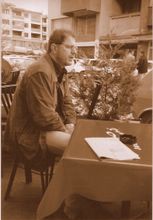 A hunted editor dodges death to bring the news to refugees
A hunted editor dodges death to bring the news to refugeesBy David Abel | The San Francisco Chronicle | 4/15/1999
TETOVO, Macedonia -- Two weeks ago, sitting alone in the basement of a friend's vacated home, Baton Haxhiu watched on CNN as colleagues, foreign reporters and NATO officials pronounced him dead by summary execution.
Haxhiu, editor-in-chief of Kosovo's leading ethnic Albanian newspaper, Koha Ditore (Daily Times), froze. He thought about his wife and 3-year-old boy. There was nothing he could do. He was a hunted man.
''It was very hard for me," said Haxhiu, 33, who recently surfaced in this largely ethnic Albanian city in northwest Macedonia. "But I was on the Serbs' list. I knew what they would have done if they found me."
On the morning of March 23, the day before NATO began raining bombs on Serbia, Haxhiu (pronounced Hah-GEE-you) drove to his office in the Kosovo capital of Pristina and found blood on the newspaper's front steps. A security guard had been killed, the daily's press burned, all the computers in the office smashed. Before "fining" him 300 German marks, Haxhiu says, police at the scene told him the newspaper would never be published again.
But the bearded editor is moving to prove the Serbs wrong. Next week, with contributions including $150,000 from the British government, Haxhiu and his scattered team of reporters intend to deliver their 24-page broadsheet for free to the thousands of refugees living in camps in Macedonia and Albania. They also plan a new Web site - Serbs destroyed Koha Ditore's previous server, according to Haxhiu - and to take testimony from refugees to document alleged war crimes for the International Criminal Tribunal in The Hague.
''What our people need right now is a sense of community," said Haxhiu, sipping a beer at a swanky cafe in Tetovo between hugs from friends and cell phone calls. "They do not have enough information. They don't know who is alive or dead or where their families are. We want to help."
Indeed, a quick tour through any of the sprawling tent cities dotting Macedonia provides a sense of how desperate the refugees are for information. Some ask foreigners to borrow cell phones and quiz them on the war. Others ask for batteries to supply their radios.
Few appreciate the value of news as much as Haxhiu. For 10 days, he moved surreptitiously from basement to basement, from mosques to friends' homes, hoping to avoid the Serbian onslaught sweeping Kosovo. His only possession was a radio.
He wanted to know what had happened to other intellectuals reported killed by Serbs after attending the funeral of a Kosovar human rights lawyer. He learned later that many of them were also alive. "The only important thing for me was the news," he said.
Haxhiu has worked as a journalist since writing for his university's newspaper in Pristina. In March 1996, with tensions mounting as Serbian leader Slobodan Milosevic cracked down on Kosovo's nearly 2 million ethnic Albanians, he started the independent Koha Ditore. The paper criticized not only Milosevic's repression, but also the growing movement toward armed resistance supported by the Kosovo Liberation Army. For its stance, the newspaper's employees became victims in the emerging conflict. Serbian police frequently harassed distributors and sometimes beat them. Haxhiu was repeatedly interrogated.
After 10 days dodging marauding paramilitary units, Haxhiu found his opportunity to escape. Through the basement window of the neighborhood mosque where he had been hiding, he saw thousands of legs scurrying in the streets. He previously had shaved his auburn beard to disguise himself. He put on a hat. When he got outside, he saw a young woman holding a baby. " 'From now on, I am your husband and this is my child,'" Haxhiu told the woman, who immediately recognized him. "She just said, 'You're alive!'"
The soft-spoken journalist sped away with the woman and child in his red Volkswagen Golf. His own wife, son and parents remained in Pristina.
Four days later, with the help of the leader of Macedonia's ethnic Albanian political party, he crossed from Kosovo into Macedonia untouched by Serbian police. He emerged in London, where Britain and other Western nations pledged to help him launch Koha Ditore in exile.
Working out of a friend’s small, unadorned office and spending most of his time exchanging news with friends from Kosovo at the café, Haxhiu says the only obstacle in his path may be the Macedonian government.
This small former republic of Yugoslavia has long discriminated against its ethnic Albanians, which account for at least 23 percent of its population. Many Macedonians fear their recently established country could turn into another Kosovo, with ethnic Albanians seeking independence o a greater Albania.
Haxhiu says he’s concerned that "paranoid" government officials might ban him from publishing in Macedonia. But he’s confident that the paper will be in the hands of refugees by next week.
"Our plan is to publish," he says. "The refugees need news. We will provide it."

